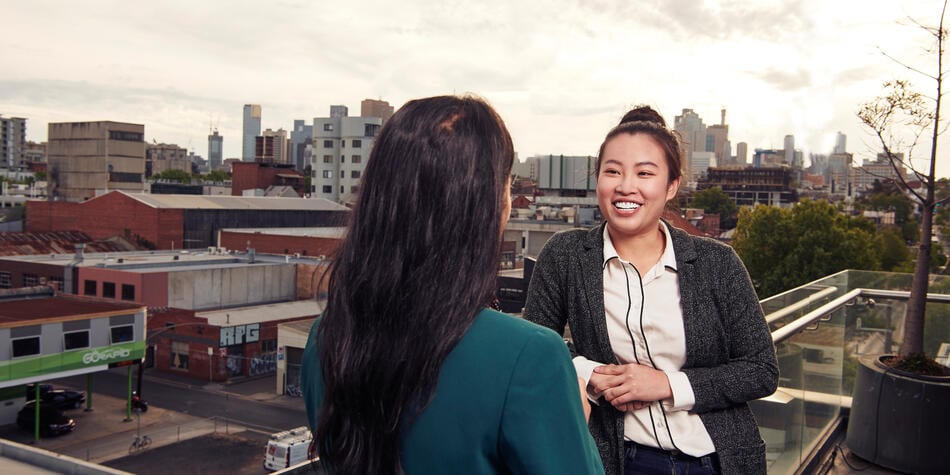How often have you heard someone say, ‘Journalism is a dying industry’?
When you’re considering forging a career in journalism, it’s not just disheartening to hear statements like that – it’s terrifying. There’s no doubt that journalism is a disrupted industry, but what people don’t talk about are the opportunities that now exist because of the digital age.
There’s a plethora of new spaces and pathways for journalists in an online world, and if you’re a budding writer, with an investigative streak and a passion for storytelling, that probably excites you a lot.
Alison McAdam, a lecturer in Professional Practice in Deakin’s School of Communication and Creative arts says the industry has seen many changes since the advent of the internet. But, there’s still some exploration needed to catch up with the opportunities available in new spaces.
‘Deakin does a good job of recognising those gaps and what’s needed in the future, and making sure Deakin students are ready for those gaps that are either coming or already exist; those niche areas,’ she explains.
If you want to future-proof your journalism career, McAdam says you won’t just need a solid foundation in core journalism skills; you need to be able to use advanced story-telling techniques, and be prepared to explore.
Adopt the skillset of a digital age journo
Even in a digital world, McAdam says the core skills of journalism haven’t changed.
‘You still need to know how to interview people, research stories, generate story ideas, and we all need to know how to write a news story.’
But an altered understanding of what journalism can – and should – be across various platforms means that more advanced skills aren’t just a nice-to-have. They’re a fundamental part of being an effective journalist.
‘You can’t graduate as a journalism student if you don’t know how to produce video, or tell a news story through audio,’ McAdam says. ‘These skills are no longer seen as separate, they are just part of the core understanding of what journalism is.
‘Journalism students get that from day one of their degree now. They have to understand that you don’t just write a news story; you need to think of all the different ways you could tell that story to different audiences on different platforms.’
This includes being able to take incredible photos, film video, even present news in podcasts. ‘We’re really looking at the advanced storytelling techniques that are out there and ensuring our students know how to do those things,’ McAdam explains. ‘And they’re usually the fun things.’
Being excited by these skills, and being prepared to adopt them will ensure your place in journalism’s changing landscape. The future of the industry is heading towards ‘more immersive storytelling abilities’, McAdam says, such as virtual and augmented reality.
‘That’s how our students need to be thinking, because that’s how they’ll be telling news stories in the future.’
Being able to communicate visually, not simply through words, is an important skill to develop.
‘We’ve already been talking about it in journalism,’ McAdam explains. 'Now we’re going to be able to teach it', especially with the creation of the new immersive learning precinct named Nyaal that’s opening in the Waurn Ponds campus in 2020.
Explore journalism’s new spaces
‘We used to talk about how journalists needed to be quite general in their interests,’ McAdam says. ‘You needed to know a lot about a lot of things.
‘Now we’re finding it’s really viable to focus on your interest or your passion, and be more of a niche reporter.’
McAdam explains there are so many opportunities now for students to hone in on a specific area they’re interested in, because ‘there are so many areas you can produce content for. The opportunities are almost endless in the media.’
The internet has allowed for a plethora of niche topics to not only surface, but thrive. ‘You might just want to be a music writer, or you might just want to report on cycling – not even sport generally, but cycling specifically,’ McAdam says.
‘The 24-hour news cycle on TV and radio is also content-heavy, and those industries need people who can make good content. That is what our journalists graduate with: the ability to make good content.’
Step into the field with confidence
Even with a strong foundation in journalistic skills and knowledge, stepping into the real-world media industry can be intimidating for graduates lacking the right preparation.
But McAdam says Deakin journalism students graduate ready for the industry thanks to the ‘real-world experiences built into the course’.
‘In third year, which is the year before you graduate, we have a unit where you can go to a local court and report court stories. You go to local council meetings and report on council stories. And you have the Dscribe website, where you’re writing stories for a real public website,’ she explains.
‘You get to go through a real newsroom process of producing content, getting it edited, revising the content and then getting it published. You get the opportunity to deal with feedback, which is so important.
‘That makes our Deakin graduates industry ready, because they graduate having had experience in what it’s like to produce content for a real news website already.’
This makes the transition into the media industry a little less scary. You’ll also get to develop your own voice as a journalist and learn key time management skills, which will set you off on the right foot.
And of course, graduating with a portfolio of published work under your belt is always impressive when looking for a job in the media industry.
Excited by the new opportunities for journalists in a digital landscape? Find out more about Deakin’s Bachelor of Communication.

